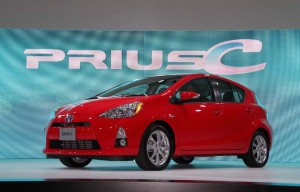
Products like the new Prius C have helped build the Toyota brand name, but a new study says its image has slipped sharply.
Manufacturers spend millions – in some cases, billions – to get customers to focus on their brands. And traditional auto industry research suggests that there are few things more valuable than a good brand image.
Or is there?
That may have been true in years past, but a new study by Consumer Reports magazine suggests “the difference between the top car brands and the challengers is shrinking. While two Japanese importers and two Detroit marques still lead in overall perception, the gap is smaller than ever.
That’s the sort of data that can send a chill through the corridors in an automaker’s marketing department, as it opens up the possibility that upstart competitors can gain a leg up with a good new product and a particularly creative ad campaign. Kia’s hamsters anyone?
“Smaller companies have benefitted from the shift,” reports the non-profit publication, “illustrated by the small electric-car builder, Tesla, breaking into the top 10” in terms of brand perception.
According to the CR 2012 Car-Brand Perception Survey, Toyota, Ford, Honda and Chevrolet remain the most well-respected of automotive marques. But they are losing ground – fast. Toyota, in particular, saw its score drop 17% compared to the 2011 survey, while Ford, Honda and BMW, among other top brands, dipped 20 points or more in the 2012 results.
Significantly, two General Motors brands, Cadillac and Chevrolet, posted declines that were only in the single digits, perhaps suggesting the maker’s image is improving after its 2009 bankruptcy.
The Consumer Reports study shows that manufacturers are subject to all sorts of headwinds, from rising – and subsequently dropping – fuel prices to quality snafus. Toyota’s much-publicized safety scandal clearly had an impact, according to the Consumer Reports study, “from which it has still not fully recovered.”
While the public is still largely unaware of emerging battery-car brands like Fisker and Tesla, meanwhile, the study found that among consumers who knew of the two makers, perceptions were strikingly high. Whether that will remain the case as their products get into more widespread use, of course, remains to be seen.
The Car-Brand Perception Survey tallies consumer responses in seven distinct areas, including safety, performance, quality and how environmentally friendly a brand is perceived to be.
Toyota was tops, overall, with an aggregate score of 131, followed by Ford, at 121, Honda, at 94, Chevrolet, at 92, and Mercedes-Benz rounding out the top 5 at 84.
At the other extreme, now bankrupt Saab had the worst brand image seen, at just 5, with Fiat, Mini and Mitsubishi each scoring a nearly-as-abysmal 7, fifth from the bottom, Land Rover scored 8.
The brands in the top overall tended to score well in most or all of the seven individual attributes, though Toyota, the leading brand in the quality and environmentally-friendly categories, didn’t even rank among the top 5 in terms of design – an area where it is frequently faulted.
Luxury brands led in styling – starting with Cadillac, BMW, Mercedes-Benz and then Lexus – though a surprise came from Chevrolet, which was the 5th-ranked brand.
Perhaps no surprise, Volvo remains the perennial leader in the safety category, but Ford followed close behind, ahead of Toyota, Honda and Mercedes-Benz, all brands that have emphasized safety as core brand values.
Meanwhile, Smart, not a brand normally seen as a leader in any category, popped up as second in the green category, just behind Toyota but ahead of Honda, Ford and Chevrolet.
One of the areas where manufacturers are facing the toughest battle is in technology. As most carmakers rely on the assistance of outside partners – from Microsoft to Bosch – rather than developing most of their digital technology in-house, it has become more difficult to maintain a lead. According to the 2012 perception study, German marque Mercedes-Benz is still seen as the brand to beat, followed by Ford, Toyota, Lexus and BMW, in that order.
